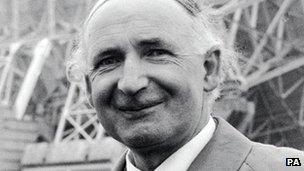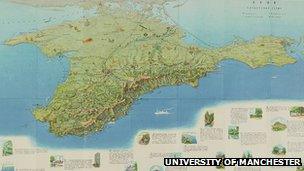Sir Bernard Lovell feared 'poisoning to remove memories'
- Published

Sir Bernard wrote that during his illness, "the family could do nothing for me nor the doctors"
The publication of Sir Bernard Lovell's diaries has shown how intelligence services feared he was poisoned to "remove memories" of a Soviet trip.
The astronomer, who founded Jodrell Bank Observatory in Cheshire, made a visit to the former USSR in 1963.
The scientist "became mysteriously ill" after the trip, which British agents said was due to radiation exposure.
The papers also reveal that Sir Bernard was offered the chance to defect during the trip.
Sir Bernard died in August, leaving instructions that his private papers detailing the trip be published.
He spoke of the trip during his life, but said the full details of it would only be revealed after his death.
His diaries from the visit in June and July 1963 have been published online by the University of Manchester.
The university has also published later papers about the trip, including a 2008 letter to his son, geologist Dr Bryan Lovell, in which he discussed the papers being "too hot to handle".
'Dust and ashes'
The diary pages detail meetings with prominent astronomers and his visits to the Soviet astronomy facilities at Yevpatoria in Crimea, but make no reference to the period of poor health.
However, he wrote in a later commentary about his trip that when his wife had come to meet him in Moscow shortly after his return from Crimea, "she scarcely recognised me as the person she had seen in England a week earlier".
In the commentary, written almost two decades after the trip, Sir Bernard wrote of how "after a few days at home, I became mysteriously ill [and] the family could do nothing for me nor the doctors".
"In the midst of happiness which surrounded me, it was as though all life had suddenly turned to dust and ashes."
He wrote that there had "never been an explanation for this sudden hiatus", though he did recall that while in Crimea, he had "been left alone in a room for no obvious reason".
"The intelligence agents thought that by some means (probably radiation), the Soviets tried to remove from my brain all memories of my trip to Yevpatoria."
However, he wrote he was unsure that whatever the truth of the "strange affair", the attempt had "failed because they failed to realise that I had written all the details of the visit in my diary".
He added that his illness lifted during a holiday to Ireland, when he "suddenly began to feel normal and thankfully all interest in life returned".
'I am an Englishman'
The commentary also reveals a meeting later in the trip with the President of the USSR Academy of Sciences Mstislav Keldysh, in which he was offered a chance to build a new radio telescope in the USSR.

The documents include souvenirs of Sir Bernard's trip, including a tourist map of Crimea
As the visit took place at the height of the Cold War, taking on such a project would have required Sir Bernard to defect.
He wrote that Keldysh said that the Soviet authorities "would be very glad if you would stay in Russia and we will build a telescope for you".
His account details that he replied: "Thank you Mr President, but I am an Englishman and wish to return to England".
As a result, he wrote that he was "relieved" when he and his wife "boarded the aircraft [home] and even more thankful when I saw the lights of London".
Sir Bernard's papers have been published as part of the university's John Rylands Library collection.
The university has held Sir Bernard's private papers since the astronomer transferred them to John Rylands Library from a safe in his office at the observatory in 2009.
- Published7 August 2012
- Published7 August 2012